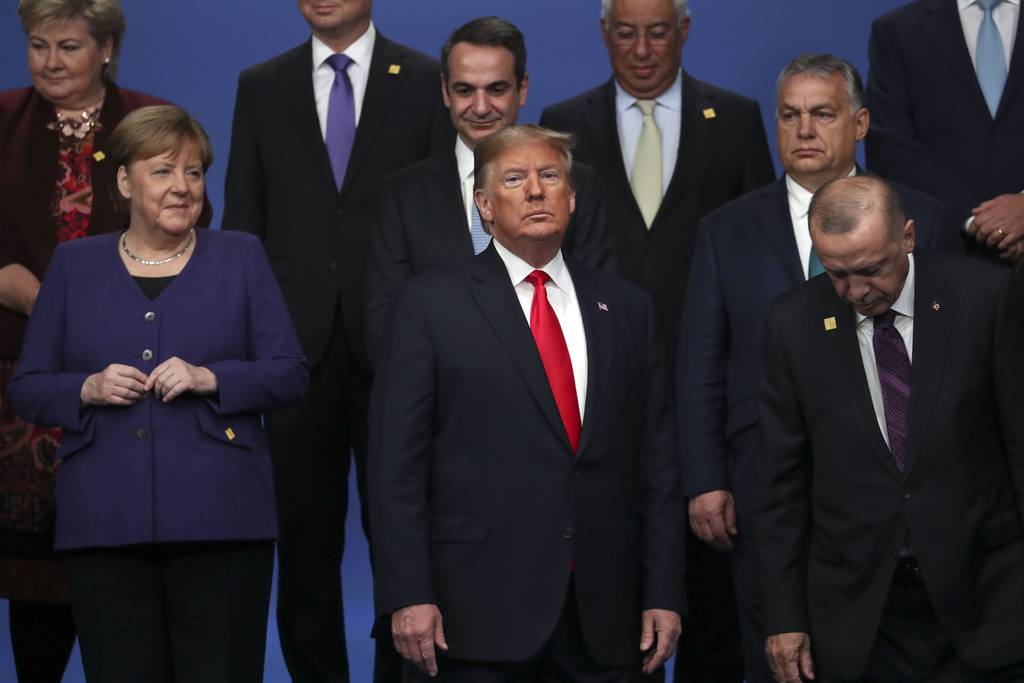
WASHINGTON ― The Senate on Wednesday passed a provision to the annual defense bill that would make it more difficult for a U.S. president to withdraw from NATO, a precautionary measure against former President Donald Trump’s potential return to the White House.
The bipartisan amendment to the fiscal 2024 National Defense Authorization Act would not allow the president to withdraw from NATO without congressional approval, requiring two-thirds of senators to vote for withdrawal. Sen. Tim Kaine, D-Va., introduced the amendment alongside Sen. Marco Rubio, R-Fla, which senators adopted in a 65-28 vote.
Trump said on Fox News this week he told NATO leaders when he was president that “I will not protect you from Russia” if they were “delinquent“ on NATO contributions.
He also said at a 2018 rally he had told U.S. allies he would withdraw from NATO if all countries do not spend 2% of their GDP on defense. The alliance has agreed on the 2% goal, but many member states have yet to meet it. Polls show Trump is the frontrunner in the 2024 Republican primary.
“The last administration, a question came up about whether a president could withdraw from NATO unilaterally,” Kaine said on the Senate floor ahead of the vote. “Our allies — who worry about different presidents — should the policy change depending upon every four years who is president, they would take this statement of congressional support in a very, very powerful way.”
If the president tries to withdraw from NATO without Senate approval, the Kaine and Rubio amendment would limit funding for withdrawal until a two-thirds majority of both the House and Senate vote to approve the decision. The legislation also authorizes Congress to establish its own legal counsel to represent the legislature before federal courts in any dispute with the White House over NATO withdrawal.
Eighteen Republicans joined Senate Democrats in voting for the amendment, including Sens. Rubio, Susan Collins of Maine, Ted Cruz of Texas, Lindsey Graham of South Carolina, Bill Hagerty of Tennessee, Cindy Hyde-Smith of Mississippi, John Kennedy of Louisiana, Cynthia Lummis of Wyoming and Mitt Romney of Utah.
The legislation is expected to pass the Senate next week, but the NATO amendment will need to survive negotiations over a final defense bill with the Republican-held House.
Sen. Roger Wicker, R-Miss., the top Republican on the Armed Services Committee, opposed the amendment, calling it “absolutely unnecessary” and arguing Trump is “fully committed to” NATO’s Article 5 collective defense clause.
“I cannot think of any currently serving elected official of significance who’s calling for suspending or withdrawing from NATO,” Wicker said on the Senate floor ahead of the vote. “If I didn’t know better, I would think that this amendment might be aimed as a slap at former President Trump.”
Wicker noted Armed Services Committee included a provision in the base bill requiring the defense secretary to prioritize NATO members who already meet or exceed the 2% spending requirement.
Following that vote, the Senate rejected 16-83 a separate amendment from Sen. Rand Paul, R-Ky., that stipulated Congress would still need to authorize military force for the president to come to the defense of NATO allies, even if an attack on another ally triggered Article 5.
Ukraine accounting
Additionally, the Senate voted down 39-60 an amendment from Sens. Josh Hawley, R-Ky., and J.D. Vance, R-Ohio, that would have required the Pentagon to change the way it calculates the cost of weapons sent to other countries under presidential drawdown authority — the mechanism President Joe Biden has used to arm Ukraine from U.S. stockpiles.
Hawley and Vance introduced their amendment after the Pentagon announced last month an accounting error overestimated the cost of weapons it has sent to Ukraine. The error means the Biden administration had more cash on hand than it previously thought to send Ukraine weapons under the authority.
The Hawley-Vance amendment would have required the Pentagon to determine the acquisition and modification costs of weapons sent under presidential authority in addition to the cost of replacing those items. It would have then required the Pentagon to use whichever value is greater to determine the drawdown cost.
“The accurate cost of equipment that we send to Ukraine is how much it costs to replace it for the American taxpayer; it’s not what it originally cost minus some measure of depreciation,” Vance told Defense News ahead of the vote. “It’s important to have an accurate accounting of what we’re spending because how do we compare ourselves against Europe and how we’re carrying the relative burden within NATO?”
Bryant Harris is the Congress reporter for Defense News. He has covered U.S. foreign policy, national security, international affairs and politics in Washington since 2014. He has also written for Foreign Policy, Al-Monitor, Al Jazeera English and IPS News.
- SEO Powered Content & PR Distribution. Get Amplified Today.
- PlatoData.Network Vertical Generative Ai. Empower Yourself. Access Here.
- PlatoAiStream. Web3 Intelligence. Knowledge Amplified. Access Here.
- PlatoESG. Automotive / EVs, Carbon, CleanTech, Energy, Environment, Solar, Waste Management. Access Here.
- BlockOffsets. Modernizing Environmental Offset Ownership. Access Here.
- Source: https://www.defensenews.com/congress/2023/07/19/with-eyes-on-trump-senate-votes-to-make-nato-withdrawal-harder/



